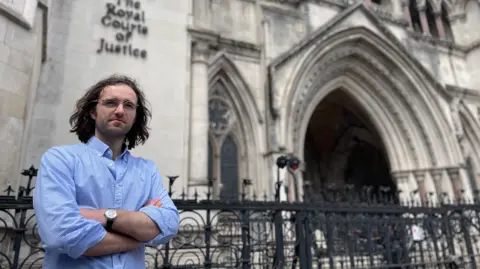Trial set for students suing UCL over Covid teaching
 BBC/ Hazel Shearing
BBC/ Hazel ShearingStudents and graduates suing University College London (UCL) over the quality of teaching during strikes and Covid lockdowns will see their cases move to trial at the start of 2026.
Around 5,000 students have brought claims against UCL, after teaching was moved online or cancelled.
Their lawyers called on the university to make "sensible settlement proposals" and avoid going to trial.
UCL said it prioritised students' wellbeing and "educational achievements".
The cases against UCL are the first to go to court but current and former students are seeking compensation from other universities too.
Lawyers are offering representation for students at UK universities who sign up via a website called Student Group Claim.
They say more than 155,000 people have signed up - although that does not necessarily mean all of them will seek payouts through the courts.
The students who are seeking compensation argue that cancelled and online teaching restricted their access to facilities and damaged the quality of teaching.
David Hamon, 29, the lead claimant in the cases against UCL, began his campaign for compensation while he was a Master’s student there in 2020-21.
He told the BBC in an interview last month that he paid £14,000 for his international politics degree, which ended up being entirely online.
Seminars intended for discussion were held on video calls, he said, during which “no-one spoke” and some people had their cameras off altogether.
Mr Hamon said the claim was about “consumer rights”.
“We purchased something and it's clear that what we got was not what we bought,” he said.
“Online degrees are less expensive than in-person degrees and that's because the costs are lower and the standard is lower,” he added.
The law firms representing the students - Harcus Parker and Asserson - argued in a case management hearing at the Royal Courts of Justice last month for a group litigation order, which would have allowed all the claims against UCL to be processed as one single claim.
That request has now been dismissed.
Instead, a few students representing a variety of experiences and scenarios will be selected as "test cases" for the trial.
The judgements reached on these cases will help determine how the other UCL students' claims are settled.
Shimon Goldwater, a lawyer at Asserson, said: "The students we represent would welcome sensible settlement proposals from UCL so that this matter does not need to proceed to trial.”
Matthew Patching, a lawyer at Harcus Parker, said settlements would be a better route than "continuing to fight this claim through to the end".
UCL said it needed more information about the individual claims.
It has previously said students should use internal procedures to complain.
'Working tirelessly'
Prof Kathy Armour, vice provost at UCL, said the university had offered an alternative dispute resolution process which was "flatly rejected by the claimants' lawyers".
"Throughout the Covid-19 pandemic, we prioritised the health and safety of our whole community and followed UK government guidance, working tirelessly to make our campus and all UCL premises as safe as possible so that a high-quality academic experience could continue to be provided," she said.
In a ruling, High Court judge Senior Master Cook said test cases would be identified at the next case management hearing, which will take place in November.
He also asked lawyers representing the students to provide more details of the students' claims, including their names, student numbers and course details.
